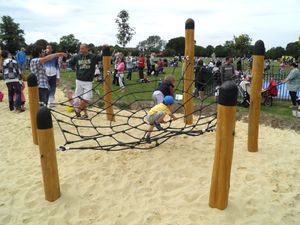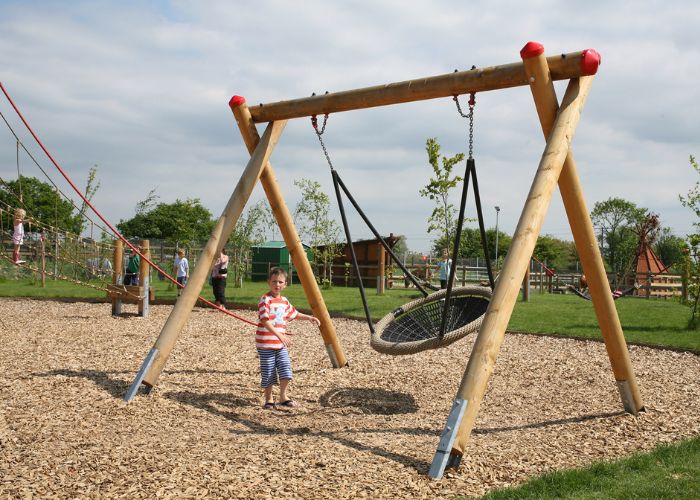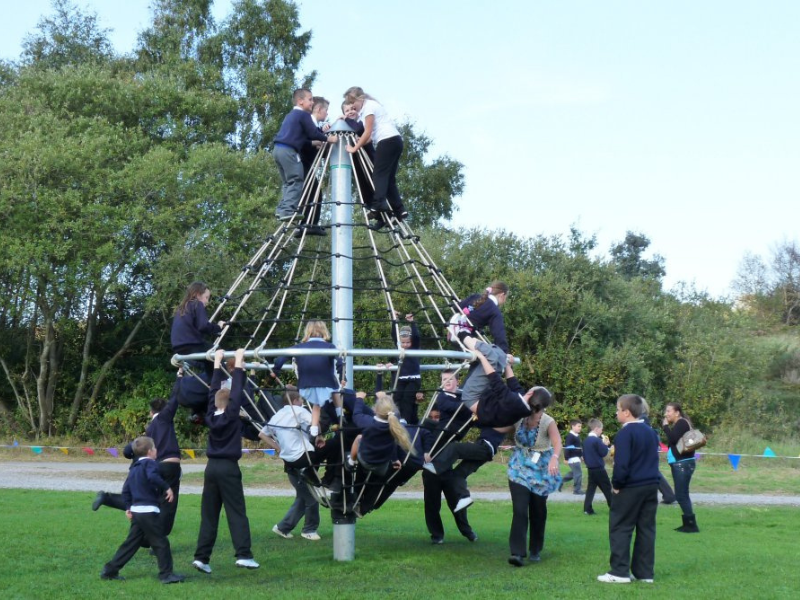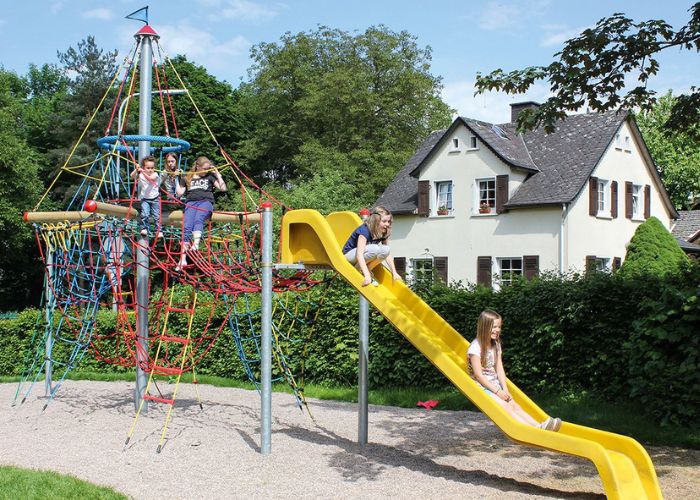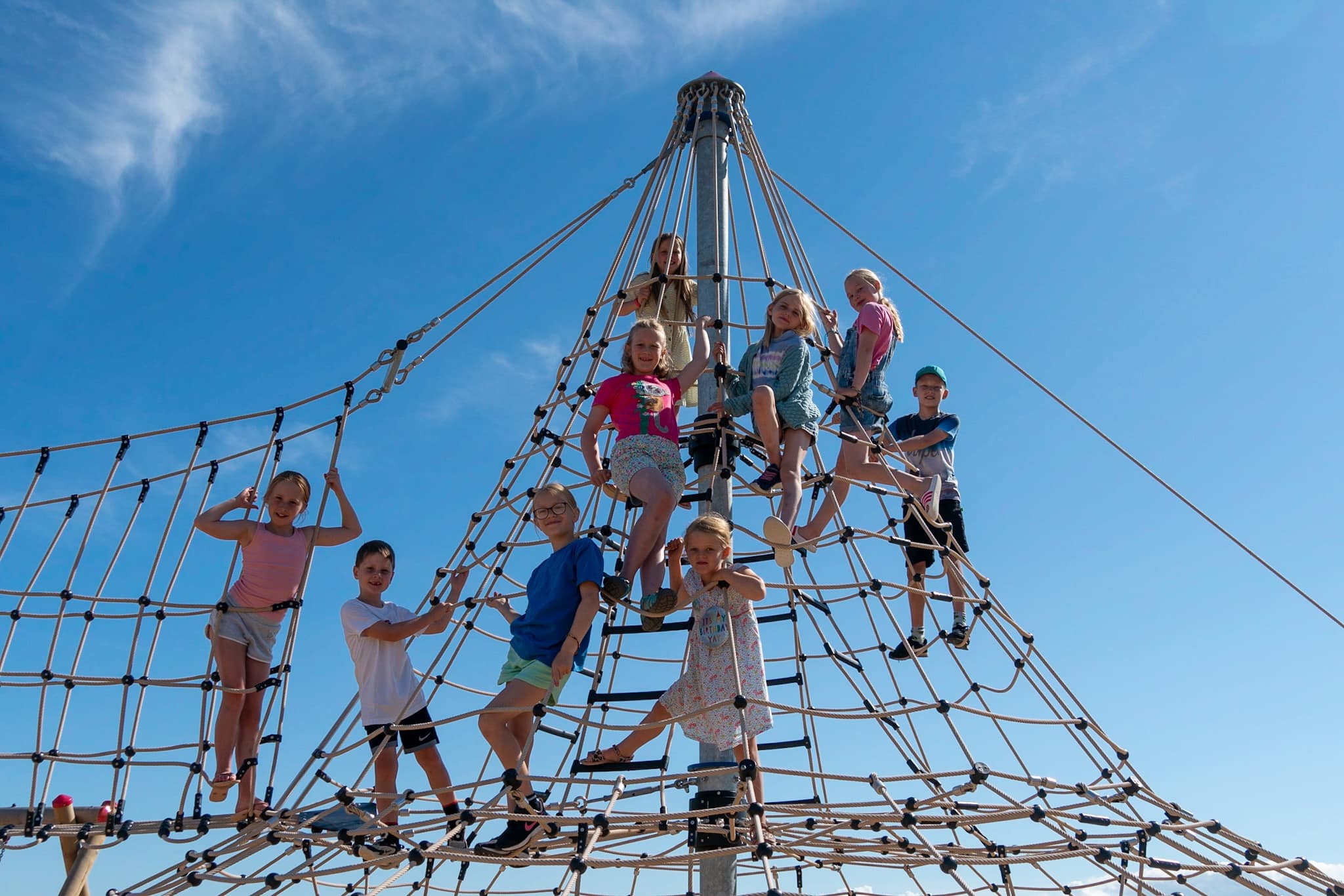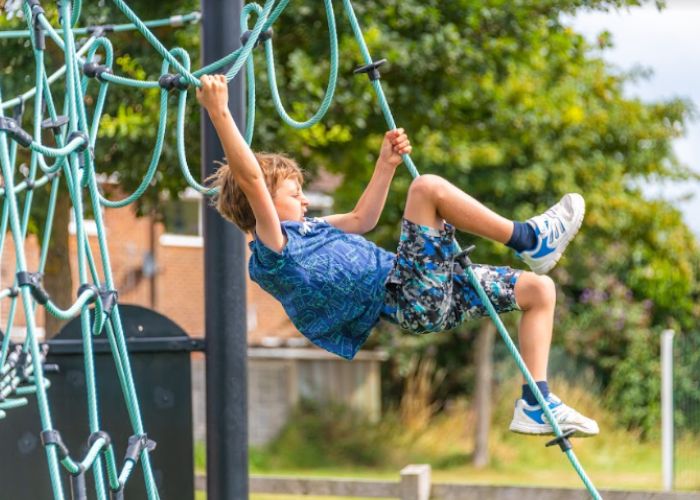7 Reasons Why Playgrounds Are Important in Schools & Communities
It goes without saying that playgrounds are an integral part of childhood. Running, climbing, swinging, and sliding – these are all activities that we remember fondly from our own time as children! But what exactly is it that makes playgrounds so important?
Encouraging children to get outdoors more and take part in activities that boost their physical, mental and social development is crucial, particularly in an age where technology often dominates our daily lives.
Both the NEC and NHS “recommend an upper limit of two hours per day” of screen time for all children. So what can we do to help children spend more time outside?
Well, playgrounds, of course, are a big part of the solution. By providing safe and stimulating outdoor environments, they can offer children a wide range of benefits.
And what better place for them to be located than in schools, where children spend a large portion of their time, and within their local communities?
The Benefits of Playgrounds for Child Development
Playgrounds are important spaces for children to engage in physical activity, social interaction, and creativity, all of which are crucial for their overall development.
Kids will learn these skills in other environments, too, like in the classroom or by simply being around other children. However, playgrounds offer a unique opportunity for children to learn and practice these skills in a fun and unstructured way.
The 7 main reasons why playgrounds are important include…
| 1. Encourages Physical Activity |
| 2. Boosts Social Skills |
| 3. Encourages Emotional Development |
| 4. Improves Cognitive Development |
| 5. Stimulates Creativity & Imagination |
| 6. Increases Confidence & Self-Esteem |
| 7. Learning Through Play |
1. Encourages Physical Activity
Playgrounds provide a dedicated space for children to engage in various forms of physical activity, such as running, climbing, swinging, and playing games.
These activities are crucial for developing motor skills, strength, and coordination.
Physical activity on playgrounds helps children build muscle and bone strength, improve cardiovascular health, and maintain a healthy weight.
Additionally, regular physical exertion fosters endurance and flexibility.
By encouraging active play, playgrounds contribute significantly to a child's overall physical development, promoting a healthy lifestyle from an early age.
Benefits of Outdoor Play in Early Years: Supporting Our Children
2. Boosts Social Skills
Playgrounds are essential environments for children to interact with their peers and help them develop crucial social skills. On the playground, children learn to communicate, share, take turns, and collaborate.
These interactions often lead to the formation of friendships and provide opportunities for children to practise empathy and understand social norms.
By negotiating the use of equipment and organising group games, children build their conflict-resolution and problem-solving abilities.
The social skills honed on the playground are fundamental to a child's development, equipping them with the interpersonal abilities necessary for success in school and later in life.
3. Encourages Emotional Development
Access to playgrounds supports children's emotional development. When children play, they experience emotions like joy, excitement, frustration, and satisfaction.
Navigating these emotions in a playground helps them develop emotional regulation skills.
Through social interactions, kids learn to express their feelings, manage stress, and cope with setbacks or disagreements.
Playgrounds also give children a sense of independence and confidence. Climbing a challenging rope pyramid structure or winning a game instils accomplishment and self-efficacy.
|
Overall, regular playground access helps children build resilience, and emotional intelligence, essential for their holistic development. |
4. Improves Cognitive Development
Playgrounds are vital for a child's cognitive development. They provide an environment that promotes learning and creativity.
When children play, they solve problems, make decisions, and think critically. For example, climbing structures or learning new game rules require strategic thinking and planning.
Playgrounds enhance children's cognitive development through puzzles, mazes, and interactive panels that boost concentration and memory.
Imaginative play fosters creativity and cognitive flexibility, while activities requiring coordination improve hand-eye coordination and spatial awareness.
These diverse experiences stimulate curiosity, supporting skills crucial for academic success and daily life.
5. Stimulates Creativity & Imagination
Playgrounds boost children's creativity and imagination, which is key for healthy development.
Open spaces and equipment like slides, swings, and climbing frames let kids invent games, create imaginary worlds, and engage in role-playing. This kind of play helps them think creatively, try new ideas, and express themselves.
When children pretend a play structure is a pirate ship or a castle, they're not just having fun; they're also creating stories, exploring social roles, and practising language skills.
Interactive elements like sandboxes, water tables, and musical panels offer sensory experiences that stimulate creative thinking.
The dynamic environment allows for spontaneous, unstructured play, where children can invent games, solve problems creatively, and explore new interests.
6. Increases Confidence & Self-Esteem
Playgrounds play a crucial role in boosting children's confidence and self-esteem.
When children navigate playground equipment, such as climbing frames or balance beams, they face and overcome challenges that build their self-confidence.
Every success, whether it’s mastering the monkey bars or scoring a goal during a game, reinforces a sense of achievement and self-worth.
Additionally, participating in group activities and games allows children to gain social approval from their peers, further enhancing their self-esteem.
Playgrounds enable children to take risks, explore their capabilities, and feel proud of their accomplishments by providing a safe and supportive environment.
|
This development of confidence and self-esteem is essential as it lays a foundation for facing future challenges with resilience and optimism. |
7. Learning Through Play
Playgrounds support learning through play, which is vital for child development. When kids play, they naturally learn and pick up new skills.
For example, games that involve counting steps or identifying colours help with early maths and language skills.
Role-playing playground equipment encourages storytelling and imaginative thinking, boosting their creativity.
Interactive equipment like swings and see-saws teach basic physics concepts like balance and gravity.
Through playing together, children learn problem-solving, negotiation, and teamwork. These activities enhance cognitive abilities, memory, and critical thinking.
Learning through play also makes education enjoyable, fostering a positive attitude towards learning and school.
The Impact of Playgrounds on a Community
Playgrounds have numerous positive impacts on a community, fostering connections and providing a communal meeting space. They serve as a gathering spot for families, neighbours, and children, encouraging social interaction and community bonding.
Parents and caregivers can engage in conversations, share experiences, and build supportive networks while their children play together.
This communal space strengthens relationships among community members, creating a sense of belonging and mutual support.
Moreover, playgrounds can host community events, such as picnics or local festivals, further enhancing the social fabric.
Playgrounds contribute to a vibrant and cohesive community by providing a safe and welcoming environment where people of all ages can come together, interact, and form lasting connections.
|
Want to see how we can help boost your community's ties? See the Broadwindsor community playground project we did for the village in Dorset! |
The Impact of Playgrounds on Schools
Playgrounds in schools significantly enhance the overall environment by promoting physical activity, social interaction, and emotional well-being among students.
They provide an outlet for children to expend energy, which can improve concentration and academic performance in the classroom.
By facilitating social play, playgrounds help students develop critical social skills and build friendships that contribute to a positive school culture.
Additionally, playgrounds offer a space for creative and unstructured play, which can stimulate cognitive development and foster a love for learning.
|
These benefits collectively support a well-rounded educational experience, helping students thrive both academically and personally. |
Let Us Help Boost Your School & Community With Industry-Leading Rope-Based Playgrounds
At Huck Play, we design and bring to life durable, safe, and innovative rope-based playgrounds that promote physical activity, motor skill development, and creativity for children of all ages.
We combine our expertise in playground design with high-quality, sustainable materials to create unique and engaging play environments for schools and communities across the UK.
We’ve worked with countless schools and local authorities to create playgrounds that not only meet safety standards but also exceed expectations in terms of play value.
We can also offer support in securing playground funding through grants, charitable contributions, and community fundraising, providing resources and advice to help you obtain the necessary financial support for your playground project.
Contact us today to learn more about our services and how we can make your playground vision a reality!
FAQs
Why Are Outdoor Playgrounds Important?
Outdoor playgrounds are crucial for child development, offering physical, social, and cognitive benefits. They provide spaces for exercise, social interaction, and imaginative play, helping children build motor skills, friendships, and problem-solving abilities while promoting overall physical and mental well-being.
What Does a Playground Symbolise?
A playground symbolises community, growth, and fun. It represents a haven where children develop physical, social, and cognitive skills through play while forging friendships and memories. Playgrounds also embody an inclusive space where all children, regardless of ability, can feel valued and engaged.
Why Are Rope-Based Playgrounds a Good Option?
Rope-based playgrounds are a good option because they promote physical activity, enhance motor skills, and stimulate creativity. Their interactive design encourages children to climb, balance, and explore, fostering problem-solving abilities and resilience. They also offer inclusive play opportunities, accommodating diverse abilities and age groups.
Can Anyone Apply for Playground Funding?
Yes, anyone can apply for playground funding. Local councils, charities, and private companies offer grants for community projects. Schools, community groups, and individuals can submit applications to secure financial support, promoting inclusive and engaging play spaces for children of all abilities.

